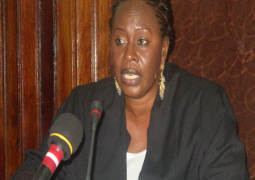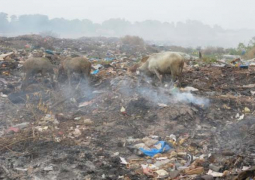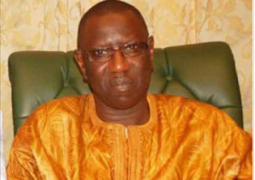
The
Social Protection Policy and Child Protection Strategy Plan were yesterday
launched during the 5th National Social Protection Forum held at the Kairaba
Beach Hotel.
The
theme for this year’s forum is: “From planning to implementation”.
The
main goal of the 5th consultative form on social protection in The Gambia is to
provide a platform for policy-makers, civil society, researchers and
development partners to exchange knowledge, ideas and experiences for
implementation of an effective, integrated and inclusive social protection
system in The Gambia.
Isatou
Njie Saidy, vice president and Minister of Women’s Affairs, in her keynote
statement, said The Gambia has started the implementation of an integrated and
inclusive social protection system to reduce poverty and vulnerability,
diminishing people’s exposure to risks, and enhancing their capacity to manage
economic and social risks, such as unemployment, exclusion, sickness,
disability and old age.
She
added that, in the last decade, The Gambia has made significant progress
towards reducing poverty and advancing the MDGs, the SDGs and Agenda 2063,
particularly with regard to food security, basic education, health and child
protection, as well as women’s empowerment.
Through
NaNA and the Ministry of Health and Social Welfare, the Maternal and Child
Nutrition and Health Results Project with its main development objective to
increase the utilization of community nutrition and primary maternal and child
health services in selected regions of The Gambia using a combination of supply
and demand sides of the RBF approach is currently being implemented, she
continued.
One
of the key elements of component 2 of the project is the food security enhanced
Baby Friendly Community Initiative (BFCI) scale-up, and the proposed
unconditional cash transfer to build resilience of vulnerable households, she
revealed.
A
total of US1.8m of the additional financing is earmarked for the food and
nutrition security (FNS) interventions, she added.
It
is expected that the project being implemented over three years (2016-2018)
will be targeted at 5 regions (URR, CRRS, CRRN, NBR and LRR). It will cover
3,000 households as beneficiaries over the three years.
The
most vulnerable households will be supported with food and nutrition security (FNS)
inputs, including backyard gardens, poultry, and small ruminants.
In
addition, communities will also be supported for longer term resilience to
establish child food banks and plant fruit trees, she went on.
Mrs
Njie-Saidy noted that, currently, there is a wide diversity of formal social
protection programmes and informal activities resulting in positive outcomes
for the most vulnerable members of population, including children, youth,
women, the disabled, and the elderly, among others.
Notwithstanding,
she said, “there are notable gaps” related to fragmentation, scope, coverage
and financing, as well as to institutional weaknesses in design and delivery of
programmes.
All
these challenges do affect the system’s effectiveness, according to her.
Hon.
Ebrima Njie, deputy Minister of Works,
in his launching statement on behalf of Minister of Health and Social Welfare,
said the main objective of the national social protection policy is to
facilitate the reform of the national social protection system, by ensuring
more efficiency and effective use of resources, strengthening management,
administration system for greater progress towards a more inclusive form of
social protection that provides basic social income and social services to
Gambians.
He
pointed out that government recognizes the need to address all forms of
violence, abuse, exploitation and negligence.
The
five-year strategic plan, from 2016 to 2020, seeks to promote the right to
protect the legal framework, bring about efficient coordination and
collaboration, develop human capacities and ensure financial resources, expand
prevention and protective services and the right to protection, he added.
Other
speakers on the occasion included Nadia Goodman, representative of WFP Centre
of Excellence, Ms Ade Mamonyane Lekoetje, UN resident coordinator, and Juldeh
Ceesay, DPS Ministry of Finance and Economic Affairs, who deputised for her
minister.





